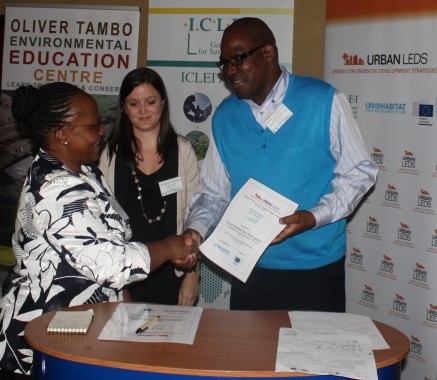
Photo: Optimized-LEDS-437×380
South African cities to attract investment through low-emission project
26 February 2013
by Richard Forster
Mayors and councillors from seven South African municipalities gathered today in Ekurhuleni, Gauteng, to officially launch an urban low-emission development project.
Together with ICLEI Africa, a local government association for sustainability, and UN-Habitat, the municipalities will formally join ICLEI’s global project, Urban-LEDS. The key component of the project is to assist cities to attract future investment by developing a low-emission development model that cuts across the municipalities’ existing development plans. ICLEI believes that those cities that reduce energy costs and become efficient and inclusive places to live and work, will be the ones that attract future investment.
“MRV [measurement, reporting, verification] is one aspect of the project, but not the only dimension,” Steven Bland, Project Manager, Urban-LEDS, told Cities Today prior to the launch. “The project will assist the municipalities to develop a GHG [greenhouse gas] inventory, and a system for monitoring those emissions over time. The assistance focuses on helping the municipalities to re-imagine their development priorities through a low-emission lens.”
The seven cities, all of a small to medium size – including Nelson Mandela Bay Metropolitan Municipality that includes Port Elizabeth, and Sol Plaatje (Kimberly) – were selected by ICLEI primarily based on population growth and their likely growing emissions profile. “These municipalities are often still just starting out, get relatively less support than the larger metropolises, and may face significant capacity issues,” added Bland.
The project can also help reduce South Africa’s dependence on fossil fuels, although Bland said that the project doesn’t specifically focus on energy generation. “Expertise will be brought in to assist those municipalities that want to, on a needs-base, develop local renewables capacity – be it micro or larger-scale projects.”
At the end of the two-year programme, organisers hope the cities will have implemented and institutionalised a low-emission planning approach into city plans and processes. Cities will also be able to tap into ICLEI’s global network and share their experiences with others in Brazil, Indonesia, India and some European cities.
“Various online mechanisms are currently being constructed, including a log-in-only section of the website for networking and sharing, and a webinar series,” explained Bland. “For invaluable face-to-face interactions, two of the seven South African municipalities will travel to meet the other project municipalities to take part in a networking seminar, workshop and study visits. The first in 2013 will most likely be in India.”
Early achievements of the municipalities will be profiled during the Local Climate Solutions for Africa Congress in Dar es Salaam, Tanzania at the end of October.









